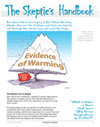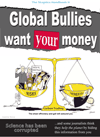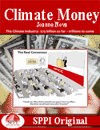|
|
Subsidy farms are designed to suck payments from plumbers, bakers and mums and dads.
By Jo Nova
When failure becomes a commodity…
Ponder for a moment how intrinsically unsuitable, maladapted, and worthless wind turbines are to a grid. Their failure is so comprehensive, multifaceted and inevitable, an entirely new and bizarre market was invented to reward their failures. Even when they generate electricity, if the time is wrong, the demand is low, or the network can’t handle it, they will still be paid. The grid can’t use the power, but the customer still gets slugged for something they didn’t use, or they couldn’t get. In the UK the costs for this useless power grew to nearly £400 million last year.
The largest provider of useless power was SeaGreen wind plant which made nearly twice as much from being “constrained” than from being of service. The Renewable Energy Foundation (REF) reports that SeaGreen earned £100 million for making electricity, and £200 million for being “constrained”. Effectively, the useful electricity it made costs a shocking £2.70 a kilowatt hour, after the other payments are included.
Obviously, when the government rewards failure, the market responds by planning to fail. It follows […]
By Jo Nova
Is the Commonwealth Games just another target of the Culture Wars?
The Commonwealth is the largest cultural union of nations across the globe. It includes one third of the world’s population in a group of 56 nations with 2.4 billion people. It could also be the largest trading block in the world, if only member nations wanted it to be that way. And who wouldn’t — well, obviously the EU and the Chinese Communist Party wouldn’t. For them, The Commonwealth is a threat, a club they can’t control, a sleeping giant. It’s kind of an inverse “Belt and Road” — but one that spread democracy and human rights.
Maybe its nothing, but Dan Andrews (premier of Victoria) who signed up to host the 2026 Commonwealth Games, then abruptly sank it, also once signed the state up for the Belt and Road program, which the Federal government blocked.
So we have to ask — who benefits from the shock announcement to cancel the Commonwealth Games?
Why suddenly was an athletic carnival not worth doing for anything less than $7 billion dollars? As The Australian points out, The Gold Coast hosted the Games in 2018 for $1.8 […]
By Jo Nova
Exxon was told to jump through circus hoops like a performing seal and report the risks of NetZero to Exxon shareholders. But Exxon pushed back by pointing out that NetZero-by-2050 is so impossible it will never happen, and therefore the risks are not even worth assessing. Furthermore, and rather damningly, Exxon said, society would be unlikely to “accept the degradation in the global standard of living required“. Exxon has taken was was supposed to be another PR win for the narrative and turned it into a media weapon.
This is exactly why the Big-Gov-Corporatist cartel wants to co-opt or destroy independent profitable corporations. In this case, companies that don’t need Big-Gov are free to point out the hypocritical inanity and absurdities which the lap-dog dependent industries like wind power and solar cannot.
Sadly, companies like Exxon still need to be brave because Big-Gov is so big, it is always the largest potential client and holds the sword of mendacious legislation, licensing and regulation as well.
Exxon Crushes Progressive Dreams That “Net Zero” Has Any Chance By 2050: It Would Mean Collapse In “Global Standard Of Living”
By Tyler Durden, ZeroHedge
The US supermajor […]
By Jo Nova
We’ve never had another third quarter this expensive
Despite setting price records — averaging $200/MWh across the whole quarter for the whole five-state National Energy Market, there’s like a cone of silence around the price of brown coal. The ABC is happy to evangelize about 30 minute “renewable energy records”, but they don’t mention that the three-month total system costs went off like a bomb.
Somehow Australia has all that free cheap green power and yet the wholesale costs exploded. The system broke:
No other Q3 has ever been this expensive.
But one unmentionable fuel type was still cheap
The average wholesale price for all generators last quarter was 20 cents a kilowatt hour (or $200 per megawatt hour), but brown coal generators were still able to supply during that same incendiary quarter for just at 4c a KWh. That was the average “winning bid”. So last quarter brown coal was one fifth the price of black coal, and one sixth the price of gas or hydro, and no one is talking about it.
The cheapest prices were from brown coal. (Far right)
Imagine if Australia had a free market in electricity? […]
Mike Cannon-Brookes might be an Australian tech-billionaire who wants to buy out one of our biggest energy companies and get rid of coal, but not only does he apparently not understand electricity grids, he doesn’t even know what a free market is.
In a free market customers could choose not to buy green electrons:
If we had a real free market in energy, we could a tick-that-box on our plan that said “100% coal fired, cheapest available reliable electricity”. Instead, all Australians are forced to buy electricity from a hobbled patchwork grid which has been repurposed as a Global Air Conditioner.
It’s a national grid crafted through “Renewable Energy Targets”, and pure hopium. Hidden in our electricity bills, taxes, and frozen-pea packets at Coles, are multiple subsidies to help wind and solar power. Poor Australians have paid to help put discounted solar panels on their rich neighbors roofs, and are paying for back up, storage, stabilizers, unnecessary two-billion dollar interstate transmission lines, and demand management plans.
Every windless minute at night the poor pay more for electricity than they would have — if the Agents of Weather-changing Sorcery were not allowed to romp freely through the energy market. Once […]
Remember the Electrical Eclipse-Fear? For months, people were coached to use less electricity during the eclipse for fear that the grid might fall over as marvelous new-revolution-solar stopped working. The media were selling the message that we might not cope without solar. I figured this would be as big a threat as a cloudy day (but easier to prepare for.).
So after all the spin, what happened? Electricity was massively oversupplied, and spot prices went negative.
Apparently people went outside to watch the sky. (At least that’s Southwest Power’s excuse.)
Most of the groups that hyped the fear don’t seem to have mentioned the failure so much:
Why Energy Traders Got the Eclipse So Wrong — Bloomberg
Grid operators and traders thought they were totally prepped for the historic U.S. solar eclipse. There was just this one thing they didn’t completely factor in: “irregular human-behavior patterns.”
That’s the technical definition, from the folks who manage the electricity network at the Southwest Power Pool, for the conduct of millions of Americans who were outdoors ogling the moon shadowing the sun instead of cranking up the A/C in homes and offices.
This was a bummer for […]
Lately the Five Star Free Market label is just a fake seal of approval for something Unfree
Just as carbon trading has nothing to do with a free market, so it is with monster free trade deals like the TPP. The free market meme won the intellectual debate of the 20th Century, but now its good name gets used and abused to sell the idea it defeated — bigger-government.
A real free market deal has only one page and a bunch of signatures. But it takes a lot of pages to list all the unfree parts and to spell it out in sub-sub-clauses that hurt or help thousands of businesses around the world. Who gets the sweetest deal out of the complexity — the card carrying networkers — those who schmooze up to the right minister or bureaucrat. The people who compete on price or quality alone would win in a real free market, and so would we as customers. Instead the document rewards the gatekeepers, the rulemakers, the industry with the best lobbyists and the monied set who can donate enough to the right causes to get a better deal.
Tipping the scales at 5,544 pages […]
It’s a tax that’s “not a tax” and a “free market” that isn’t free.
Joy. An emission trading scheme (ETS) is on the agenda again in Australia. Here’s why the first priority is to clean up a crooked conversation. If we can just talk straight, the stupid will sort itself out.
The national debate is a straight faced parody — it could be a script from “Yes Minister”, except no one would believe it. Bill Shorten argues that the Labor Party can control the world’s weather with something that exactly fits the definition of a tax, yet he calls it a “free market” because apparently he has no idea what a free market really is. (What union rep would?) It’s like our opposition leader is a wannabe entrepreneur building a Kmart that controls the clouds. Look out Batman, Billman is coming. When is a forced market a free market? When you want to be PM.
The vandals are at the gates of both English and economics, and we can’t even have a straight conversation. The Labor Party is in flat out denial of dictionary definitions — is that because they can’t read dictionaries, or because they don’t want an honest […]
Oh the dilemma. German Greens have been so “successful” that coal use is rising fast. They helped get rid of the nukes in 2011, punished coal, and subsidized “renewables”. But woe…. energy has to come from somewhere, so the paradoxical crunch comes. Green policies mean that everyone is poorer, but the cheapest energy comes from coal …
The coal industry must be praying for more Green activism:
“IT’S been a black Christmas for green thinkers as Germany, the world leader in rooftop solar and pride of the renewable energy revolution has confirmed its rapid return to coal.
After scrapping nuclear power, Germany’s carbon dioxide emissions are back on the rise as the country clamours to reopen some of the dirtiest brown coalmines that have been closed since the reunification of east and west. The Australian
Though some say the problem is “carbon credits” are too cheap. (We need to be poorer?)
“…new figures show that coal power output in 2013 reached its highest level in more than 20 years. Researchers blame cheap CO2 emissions permits, and demand urgent reforms.
The stats: Germany is using almost as much coal as it did in 1990:
In 1990, Germany’s brown coal-fired […]
Credit to The Australian for printing both points of view. Published as an Op-Ed today.
Carbon credits market is neither free nor worth anything by: Joanne Nova From: The Australian July 31, 2013 12:00AM
THE paradox du jour: people who like free markets don’t want a carbon market, and the people who don’t trust capitalism want emissions trading. So why are socialists fighting for a carbon market? Because this “market” is a bureaucrat’s wet dream.
A free market is the voluntary exchange of goods and services. “Free” means being free to choose to buy or to not buy the product. At the end of a free trade, both parties have something they prefer.
[Those who know what real free markets are know that an emissions trading scheme is not and never can be a free market. The “Carbon-Market” is a market with no commodity, no demand, and no supply. Who needs a “carbon credit”? The government entirely determines both supply and demand.]
A carbon market is a forced market. There is little intrinsic incentive to buy a certificate for a reduction in carbon dioxide emissions. It says a lot about the voluntary value of a […]
Gillard once lauded the genius of the carbon market. That part of the “free” market which is free to move, is moving — and right out. The smart money is saying that carbon trading is a dead dog. It’s a has-been-tulip, a sick puppy, a sinking ship.
The future of global carbon trading is so “certain” that Barclays Bank is not even bothering to leave one part time guy in the US office with a post box, so they can pretend they still have an interest in it. The mood has so changed, they see an advantage in letting the world know they’re not wasting a single cent more on carbon trading in the United States of America. Well that made my day. :-).
“That is not good news for carbon-dioxide trading, especially not in the US,”
Barclays was the first UK bank to set up a carbon trading desk, and fast to move into carbon trading: “Barclays Capital is the most active player in the emissions trading market, having traded some 300 million tonnes as at February 2007″.
Barclays Closes US Carbon Desk In Latest Cap And Trade Setback
8.9 out of 10 based on 94 […]
A small group of selected rulers just raised a hand, changed the rules, and sent billions of dollars from some people to some others.
This type of arbitrary control over the carbon market shows why it is a misnomer to call it a “free” market, and why a “market” is the wrong tool to try to use to reduce emissions. CO2 is a universal molecule, found in every walk of life and many inanimate processes. We can’t include them all, and someone somewhere gets to decide which ones count and which ones don’t, and how many of them we are allowed to emit in the first place.
Supply and demand of CO2 emissions are not set by a free market (you know, voluntary and willing participants exchanging things for mutual benefit). The bureaucrats just mandated an illusion of market forces, within a range set by said ‘crats. The price of carbon credits had gotten too painfully low for the rulers and their patrons and fans, so something had to be “done”. They made the carbon caps more stringent. If the price was too high, they would have loosened them (and they admit as much below). This has nothing to do […]
Carbon prices have plummeted in the US.
(So they are that much closer to their true value…)
The Regional Greenhouse Gas Initiative sold 40.7 million permits for $1.88 each, 19 cents lower than the last auction held in March and 2 cents above the minimum allowable bid, the cap-and-trade program said on its website today. Each permit in the carbon trading program for power plants from Maryland to Maine represents one ton of carbon dioxide.
Why are prices so low? On the one hand, people have doubts about Congress creating a national market for them. Fair enough. But on the other hand, “Tim Cheung, an analyst with Bloomberg New Energy Finance said: “Demand for power hasn’t increased with the economic recovery…”
Since people aren’t buying as much electricity there are spare “permits to pollute” all over the place. But it begs the question of what kind of economic recovery it is, if it doesn’t need … power?
Can I sell you some air over China?
Meanwhile some NGOs are waking up to the scammability of permits for invisible unverifiable goods. CDMWatch was set up by a group of NGO’s and has found the firms that sell the […]
|
JoNova A science presenter, writer, speaker & former TV host; author of The Skeptic's Handbook (over 200,000 copies distributed & available in 15 languages).

Jo appreciates your support to help her keep doing what she does. This blog is funded by donations. Thanks!


 Follow Jo's Tweets
Follow Jo's Tweets To report "lost" comments or defamatory and offensive remarks, email the moderators at: support.jonova AT proton.me
Statistics
The nerds have the numbers on precious metals investments on the ASX
|












Recent Comments